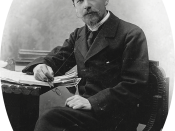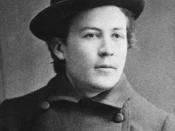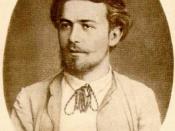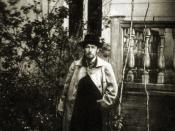The words Human Dignity can maintain a major aspect in ones life. Human Dignity generally refers to how one expresses him self and having self respect for yourself. As I read both of the Passages, I noticed how Human Dignity really comes into play in life. In Passage 1, a short story written by Anton Chekhov, clearly described and explained how Mashenka Pavletsky, the main character, has self-respect for her self. In the autobiography written by Issac Singer, he also shows how the Old Women, Washerwomen, Had Human Dignity for her self.
In Passage one, Mashenka is a true and generous women. In line 4, Chekhov, uses the literary technique called simile. He is comparing the porters face "â¦..red as a crab." Passage one was about distrust and dishonesty. Mashenka being the main character in this short story, who has just graduated from boarding school, was going to her boarding house room when she noticed that everything was touched and was moved from the exact place where it was left.
Then she was told that the owner's wife of the house has been raiding their rooms because she was in search of a brooch that was worth nearly $ 2000.00. When she noticed that she has had her privacy invaded she had lost all her trust into the lady. She has gained more self-respect than she has ever had because of this situation.
Anton Chekhov, The author of this short story, has proved a well point in how human dignity is very important to our society and community. He shows how Mashenka has gained more dignity by confronting the owner of the house that she will be moving. When the owner tells her that he took his wife's brooch she felt even more betrayed. While they were having dinner that night, the author uses the technique called foreshadowing. In line 6 and 7, Chekhov, is saying "Madame Kushkin is in a fit, most likely, or else has quarreled with her husband." He is trying to make it clear to the reader that there would be an argument or an incident that would happen and change the scenario. Also, in line 55 the author uses a technique called onomatopoeia. He is pointing out the exact sounds in that scene.
In Passage two, Issac Singer is describing the feelings and thoughts he had for his mother's washwoman. He is describing the personality and the physical appearance of this old lady. He is stating how old and wrinkled she was. The author also uses many literary terms. He used many personificational statements. One statement that proves this is when he says that " The women's eyes are as blue as the sky." This old washwoman was able to stand up to any weather. He says once how the winter was harsh, cold, people dying, icicles forming, and many other life threatening incidents and still the old lady was able to wash the clothes and bring them back on time. They used to sit down and talk, get warmed up before the next load and so on. One time they gave her their clothes and linens that needed to be washed. They haven't heard from her for a while. She usually brings the clothes down back in about 2 weeks, three weeks maximum. They got very worried. Finally, 5 weeks passed and here comes the old women looking worst as ever. Mouth Frozen, face red, cant move finger and she still settled to get the job done. The Mother brought her inside and warmed her up. After she got warmed up and was able to speak, she told the family that she had been ill, very ill. Someone had called the doctor for her and once the doctor checked her out, the doctor notified the priest and told him to come over. The son of this old lady had already paid for the funeral and coffin. She then said to the family, "I could not rest easy in my bed because of the wash.", "The wash would not let me die." - Lines 59 and 60 - This shows how this women really has human dignity for her self.
If I was to give the meaning of human dignity in one word in my opinion, it would honestly be "Washwomen". This lady has really expressed her feeling and desire for washing clothes and linen. People have brought her down by telling her that she is going to die soon, she is old, and other remarks. Even though she was very ill, she still managed to make it alive and well. After a while the family noticed that she hasn't returned. They knew it was over for her. The author tends to use a good amount of literary terms. One term I found was a hyperbole. In lines 61 - 62, the mother says "With the help of God you will live to be a hundred and twenty." Also, another one is Simile. In lines 17 - 18, he says "In the winter, it would become as brittle as glass and almost break when touched." Singer also shows how he felt about this lady. He felt very sad for her and he thought she was in the best of shape considering the other elderly women there are.
Both Mashenka and the Washwomen had many good qualities in their personalities. Mashenka has proven her self with having a great amount of dignity and also showing that she has respect for herself and others. Also, the Old Washwomen also has a great deal of potential and dignity. She also has a great motive. The washwoman has survived many harsh conditions, and has still managed to continue her job and pursue her hobby. They have thought that she was going to die, but she felt strong and couldn't resist not doing her favorite thing.





